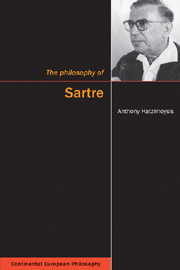6 - Being
Summary
Being and Nothingness holds pride of place in Sartre's philosophical corpus. It is the culmination of a decade's involvement with phenomenological thought and sets the background for the moral, psychoanalytic, aesthetic and political propositions Sartre will articulate in the rest of his writing career. In between the methodological c oncerns that inform his early work, and the applied research that characterizes most of his later projects, there lies a text of substantial claims about the nature of being. The Greek word for “being” is on and the philosophical “discourse” or logos about being is ontology. Sartre conducts his ontological enquiry by adopting the standpoint of phenomenology, that is, by enquiring about being as it manifests itself. His analysis is closely attentive to the experience of what there is, providing a meticulous description of our encounter with being in perception, thought, feeling and action. That description purports to identify the basic structure of what there is, to analyse the grounds as well as the limits of our ability to affect how things are, and to illuminate the meaning of human conduct towards the world, towards oneself and towards others.
Given the foundational nature of an enquiry into being, and the wide scope of the Sartrean description of major types of experience of what there is, Being and Nothingness is a rich source of important ideas that pertain to most fields of philosophical research.
- Type
- Chapter
- Information
- The Philosophy of Sartre , pp. 107 - 124Publisher: Acumen PublishingPrint publication year: 2011

